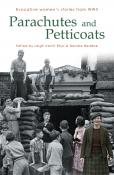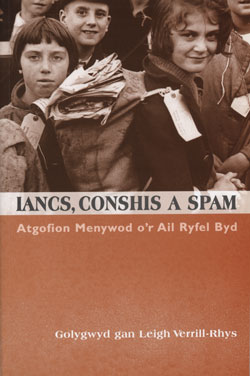Before you read this post, you may want to start at the beginning of the Avalon Authors Online collaborative novel, Along for the Ride.
June 18, 2012
Along for the Ride
Chapter Eleven
by Leigh Verrill-Rhys
After my initial burst of courage, I realized I was playing by their rules. Never trust a man who asks you to trust him, another pearl of wisdom my mother imparted before her death. Sure, he had green eyes and his lips were kissable. And yes, I did feel safe when he held me. True, he turned up when the danger was dire. However, and this was a big however, Stan was always around when danger struck, like a lightning rod.
Here I was filthy, exhausted, humiliated and angry. Mel wasn’t going to come with any voodoo feelings to make me any less angry so I took the only action of any sensible nature, precisely calculated to get me out of there and give me time to think. I reached into my deepest self and brought up all the reasons to confirm Seattle and everyone I had met was my worst nightmare and convinced myself I was never going to see the sun again.
Miraculous result. I sobbed. I sobbed inconsolably, threw my arms over my face and ran from that padded room. I wasn’t insane but I soon would be if I didn’t get my act together, take control and find an escape route, pronto. I also wasn’t as complete an idiot as either Stan or Mel thought I was. However, adorable that man was under normal circumstances, I had suffered more than enough to understand that he was not good for me.
Hmmm, cinnamon. Okay, yes, I knew the whole score. That fact did not change my determination to take back my life and purpose. I did not want to be involved in their intrigues. I wanted the sun, the heat and the frivolous structure of my desert idyll.
The next best thing was a sharp turn at the end of the hallway, a white panel door and a flip of the wall switch. A double, tiled walk-in shower cubicle with a sports power head. The secondhand clothes were a distant memory, piled like so much waste paper on the floor and I stood under the pulsing spray, at the maximum temperature I could tolerate, just to feel warm and clean again.
Not for long. I twisted my head under the spray, soaking up as much hot water as possible as though I could find clarity in the massage and all the time Stan was pounding on the door, demanding to know what I was doing and, “I have to talk to you, Sonya. Once you hear everything I have to day, you’ll understand why we had to do this.”
As if I didn’t understand. As if I would find it all very amusing and of course I didn’t mind being terrified out of my wits. After all, this was all in the name of integrity, security, justice, good business, or whatever other excuse they used to justify manipulating me into their mysterious, nefarious, criminal, need-to-know affair.
Not me. I wasn’t their pigeon anymore. I could live without someone of Stan’s character in my life. I could definitely live without that interfering matchmaker, Auntie Mel. Just let me get out of Seattle. Take me back to Phoenix, Scottsdale, Mesa, Tempe , Chandler. Let me roam the high desert and cut cookies for the rest of my life. Please.
“Sonya? Sonya, darling, come out. We need to talk.”
I ignored the insistent tapping on the panelled door and the silky voice pleading with me to open it. Go away, Stan. The hot spray of water on my bare shoulders was the tonic I needed to get the aroma of cinnamon out of my head. Agent M4. Mel and her voodoo feelings and cinnamon-colored hair.
I tilted my face into the spray, scrubbed away the streaks of mascara and blusher and who knew what my foundation had done to enhance my questionable allure. There was no doubt in my mind that the whole horrendous adventure had been a hugely unfunny practical joke, at my expense. I met my reflection in the steamy mirror. Bedraggled. All for a supposed Seatlle tourist destination or some such thing. Reality TV. Oh, please! Did they really think I was that gullible? Did they really think I was so desperate I’d fall for an admittedly handsome hunk who made me feel safe all the time he was tormenting me?
I don’t think so, Mel. I was screaming in absolute silence. Irate, insane beyond even the semblance of reasonable. “All I want,” I hissed into the slit between the door and the warped doorframe, “is a flight on Southwest right back to Phoenix – absolutely anywhere but this soaking wet, drip of a place. Do you hear me, Stanley whoever-you-are?”
“I hear you.”
He sounded as flat as my hair, plastered to my aching skull. “Not funny anymore, is it?”
“Not when you put it like that, Sonya.”
“Right. So you get on that computer you’ve got stashed away somewhere in this phoney hideout or whatever it is and find me a flight home.”
“I don’t think I can do that.”
“Why not?”
“I’m not very technical. And I really don’t want you to go.”
“You should have thought about that before you and Mel and Anna and Agent M4 and your mother and Darla and those fricky and fracky cousins got all your twisted minds together to entertain me in Nightmareville, Seattle, Lesser Twin of the Amazon Rainforest.”
“You’re mad, aren’t you? You’re pretty mad, I guess.”
“You know what makes me really, really mad?”
“What’s that, Sonya?” His voice was small, like a child trying to wheedle his way out of being sent to his room. “Anything I can do?”
“What makes me really mad, Stan with the green eyes and warm-cookie-smell and latte foam on his lips, is that I fell for it, even for a little while.” He murmured something to someone – probably Anna or Fricky-Frack but, even with my ear stuck to the door, I couldn’t hear. “And while you’re discussing my future, Stan, find me something to wear. Something befitting my character and temperament. I don’t want to arrive in Phoenix looking any less sophisticated than when I left.”
“I’ll see what I can do.”
He was so accommodating, so gentle. How could I possibly continue being so mean to him? I looked straight into my face, stripped bare of any artifice. That’s why and how.
The tapping resumed after a lot more mumbling and Anna said something about the clothes I wanted. By now I was clued in to their tricks. All they got was a slim opening with my whole body braced against the door. The outfit was a bit wrinkled by the time it was shoved through the crack I allowed but not half bad for a phoney hideout somewhere in the Northwest. I had no illusions about what might happen when I emerged from the safety of the shower-room. At least, I no longer looked like the poor relation of a gorgeous travel agent.
Only Stan stood in the hallway. He’d found time to clean up, rest up and shave. His eyes were less haunted but still full of that you-know-you-can-trust-me concern. I glanced neither right nor left but grasped the inevitability of my inability to escape at that moment. I walked straight into his arms and did exactly as I had been dreaming of doing. I buried my face in his shoulder, inhaled with all my might.
“You’ll keep your promise, won’t you?”
“I will, Sonya. You can trust me.”
***
A dust-speckled ray of light struck at my eyelid. All across the room, shelves of sunshine forced their way through the Venetian blinds. I didn’t recognize the room, just the ever-present aroma of fresh-from- the-oven cinnamon cookies. When my head stopped spinning, I crept to the window and peeped out .
“Well, what do you know, Toto? I’ve a funny feeling we’re not in Seattle anymore.”
Stan may have kept his promise, but there were very few rainbows in this part of the world.
***
TO BE CONTINUED
look for Chapter 12 on July 2




















